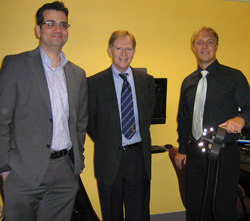Clinical depression is common, disabling and hard to treat. Although some patients can find relief via therapy or anti-depressants, many do not. In the GTA alone, an estimated 100,000 people suffer from depression that does not respond to either medications or therapy.
One promising new treatment for depression involves neuromodulation—the use of medical devices to increase or decrease brain activity. In 2005, TWH made headlines around the world with the discovery that deep brain stimulators (a kind of pacemaker for the brain) could be used to treat severe depression in patients who had failed all other treatments. Although the treatment was an astonishing success, it did require an expert neurosurgeon to implant a pair of electrodes deep within the brain itself—a complex procedure and a daunting prospect to most patients.

Drs. Peter Giacobbe, Sidney Kennedy
and Jonathan DownarBut what if there were a way to stimulate the brain painlessly and noninvasively, without surgery or anesthesia? Over the last two decades, researchers have been developing just such a treatment, called repetitive transcranial magnetic stimulation, or rTMS. An rTMS machine can generate magnetic fields as powerful as those in an MRI scanner, but focused into an area roughly the size of a quarter. These magnetic pulses pass harmlessly through the skull to excite the neurons underneath the stimulator. Over time, rTMS can gradually increase or decrease the activity of specific regions of the brain.
Research has shown that rTMS is helpful in treating depression and other psychiatric illnesses, even when medications fail. It also has few side effects—little more than a temporary headache in most cases. And thanks to new MRI-guidance technology, it is now possible to deliver rTMS with millimetre precision to almost any location on the outer surface of the brain. MRI guidance helps ensure that the rTMS stimulation goes to where it is needed the most in each individual patient.
TWH opened its first dedicated rTMS clinic in January, and will now begin offering the option of MRI-guided rTMS to patients with depression.
"It took about six months and around $120,000 to purchase the equipment and get it up and running," says Dr. Jonathan Downar, founder and co-director of the UHN rTMS Clinic. "We've been lucky to have three very generous benefactors whose donations helped establish the clinic. We're also fortunate to have the support of world-renowned experts in mood disorders, TMS and brain imaging right here at TWH. There are very few places in the world where you can find all of these specific skills under one roof."
Dr. Peter Giacobbe, the other co-founder of the clinic, emphasizes the importance of bringing rTMS to UHN: "We are now the only hospital in Ontario, and only one of a few in North America, that is able to offer patients a full range of neuromodulation treatments for psychiatric illness."
Drs. Downar and Giacobbe plan to conduct clinical trials of rTMS in patients with depression and bipolar disorder. By drawing on recent discoveries in the neuroscience of emotion, they hope to making the technique still more effective in the years to come.
